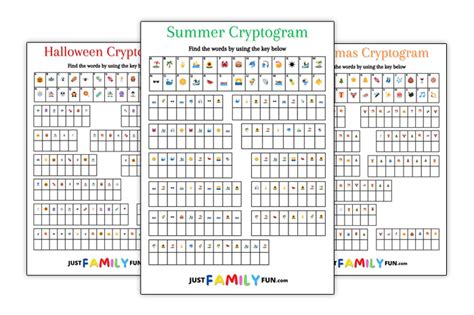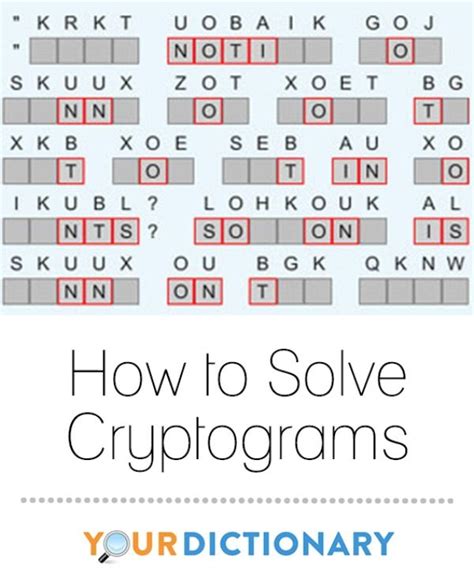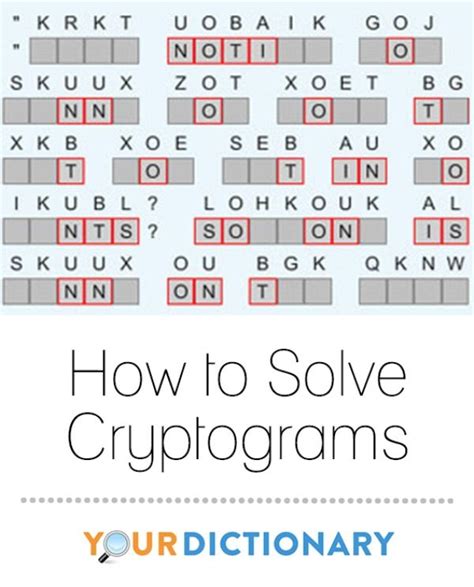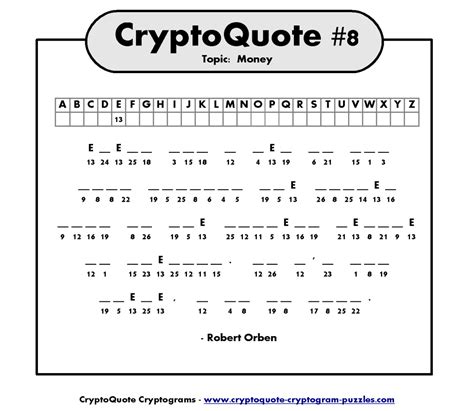Do you remember that rush you get when a hidden message finally clicks into place? That "aha!" moment when the jumbled letters suddenly form a coherent, meaningful phrase? For me, it was during a particularly dull afternoon, scrolling through endless streams, when I stumbled upon a simple online cryptogram. I was instantly hooked. The sheer satisfaction of cracking that first code was exhilarating, and I've been a puzzle enthusiast ever since. If you're looking to ignite that same spark, challenge your brain, or simply unwind with a satisfying mental workout, then you're in the right place!
We’re diving deep into the wonderful world of free printable cryptograms. Forget expensive puzzle books or complicated apps; the joy of a good old-fashioned pen-and-paper code-cracking session is truly unmatched. Whether you’re a complete beginner eager to learn the ropes or a seasoned pro hunting for your next challenge, this guide will not only point you to the best resources but also arm you with the insights you need to become a cryptogram master.
Finding Your Perfect Puzzle: Categories of Free Printable Cryptograms

Finding the right cryptogram is like choosing the perfect coffee – it depends on your mood and your desired buzz. Here are some categories of free printable cryptograms that cater to every taste and skill level.
### 1. Beginner-Friendly Cryptograms: Your First Steps into Codebreaking
If you're new to the world of cryptograms, starting simple is key to building confidence. These puzzles often feature shorter quotes, more common letters, and sometimes even hints. They're designed to gently introduce you to the process of frequency analysis and pattern recognition without overwhelming you.
- Short & Sweet Quotes: Look for puzzles with famous proverbs or short, memorable lines. *I used one of these to introduce my nephew to cryptograms, and he loved cracking "All that glitters is not gold."*
- Common Letter Focus: Some puzzles emphasize words rich in common English letters like E, T, A, O, I, N.
- Themed Starters: Cryptograms based on a familiar theme (e.g., animals, food) can provide context clues.
- Simple Sentence Structure: Puzzles with straightforward grammar are easier to decipher.
- Numbered Clues: Occasionally, beginner puzzles might provide a few letter-to-letter correspondences to kickstart your solve.
- Single-Word Puzzles: Start with decoding just one word, then move to sentences.
- Kids' Cryptograms: Often simpler, larger print, and use vocabulary appropriate for younger solvers, making them great for adults just starting too.
### 2. Themed & Seasonal Cryptograms: Fun with a Purpose
Add an extra layer of enjoyment by choosing cryptograms tied to specific themes, holidays, or current events. These are fantastic for parties, classroom activities, or just to get into the spirit of the season.
- Holiday Puzzles: Christmas quotes, Halloween sayings, or Valentine's Day messages make for festive fun. *I once printed a set of spooky Halloween cryptograms for a family gathering; everyone had a blast trying to solve "Trick or treat!"*
- Literary Quotes: Famous lines from books, poems, or plays offer a sophisticated challenge.
- Historical Sayings: Deciphering quotes from historical figures or significant events can be educational.
- Motivational Messages: Uncover uplifting words of wisdom.
- Pop Culture References: Cryptograms featuring quotes from movies, songs, or TV shows.
- Nature & Animal Themes: Puzzles about the natural world or specific creatures.
- Foodie Fun: Cryptograms about cooking, recipes, or famous food quotes.
### 3. Advanced Cryptograms for Seasoned Solvers: The Ultimate Challenge
Ready to really test your mettle? These cryptograms are designed to push your limits. They often feature longer passages, less common letter distributions, or more complex sentence structures, requiring deep analytical thinking.
- Lengthy Passages: Multiple sentences or even short paragraphs that demand sustained focus.
- Obscure Quotes: Less familiar quotes make it harder to guess based on general knowledge.
- Uncommon Letter Combinations: Puzzles that don't rely heavily on typical letter frequencies.
- Minimal Punctuation/Spacing: Some challenging cryptograms might reduce visual clues.
- Classic Cryptograms: Many historical cryptograms (e.g., from old puzzle books) offer intricate challenges.
- Multi-Quote Puzzles: A single printable sheet containing several unrelated cryptograms.
- Self-Referential Cryptograms: Puzzles where the solved message talks about puzzles or codes themselves.
### 4. Cryptograms for Kids & Family Fun: Bonding Over Brain Games
Cryptograms are an excellent way to introduce logic and deduction to children in a fun, engaging way. These puzzles are designed with simpler vocabulary and often come with engaging themes.
- Animal Facts: Simple sentences about different animals.
- Favorite Characters: Puzzles featuring popular cartoon or storybook characters.
- Riddles & Jokes: Solve the cryptogram to reveal a funny riddle or a punchline.
- Basic Vocabulary Focus: Uses words commonly known by younger children.
- Large Print & Spacing: Easier for small hands and eyes to manage. *My personal favorite type for kids are the ones that turn into a simple riddle – it adds an extra layer of fun!*
- Coloring Page Cryptograms: Combine puzzle-solving with a creative activity.
- Alphabet Learning Integration: Some puzzles subtly reinforce letter recognition.
### 5. Educational Cryptograms: Learn While You Play
Who says learning can't be fun? These cryptograms blend mental exercise with knowledge acquisition, making them perfect for students or anyone curious to expand their horizons.
- Vocabulary Builders: Cryptograms where the solved words introduce new vocabulary.
- Historical Figures' Quotes: Learn about history through the words of its key players.
- Scientific Principles: Uncover basic scientific facts or concepts.
- Geographical Facts: Puzzles related to countries, capitals, or landmarks.
- Literary Analysis: Decipher quotes about literary themes or authors.
- Foreign Language Basics: Simple cryptograms in other languages (e.g., common French phrases).
- Grammar & Spelling Focus: Puzzles where solving helps reinforce language rules.
### 6. Quick-Solve Cryptograms: Perfect for a Short Break
Sometimes you just need a quick mental snack. These cryptograms are designed to be solved in a short amount of time, making them ideal for coffee breaks, commutes, or when you just need a brief mental diversion.
- Short Sentences: Usually one or two concise sentences.
- Common Phrases: Puzzles that reveal everyday idioms or expressions.
- Single-Word Challenges: Deciphering a single, perhaps slightly longer, word.
- Warm-Up Puzzles: Use them as a prelude to a more challenging cryptogram session.
- Daily Dose Puzzles: Many websites offer a new quick-solve cryptogram daily.
- Lunch Break Brain Teasers: Perfect for a 5-10 minute mental workout.
- Travel-Friendly Puzzles: Easy to print and take on the go for quick solves.
### 7. Brain-Bending Cryptograms: The Tricky Ones
These are the cryptograms that make you scratch your head, go for a walk, and then come back for more. They often play with your expectations, using clever letter substitutions or unusual quote choices to create a truly challenging experience.
- Double Substitutions: Cryptograms where a letter might substitute for more than one letter or vice-versa (rare, but they exist to really stump you).
- No Obvious Letter Frequencies: Puzzles crafted to minimize the typical high-frequency letters.
- Puns or Wordplay: The solved message might contain a pun, adding a layer of humor and complexity.
- Unusual Characters: Some creators might use symbols or less common letters in the ciphertext.
- Multi-Line Poetry: Deciphering a rhyming poem can be extra challenging.
- Cryptic Clues: Very subtle hints that only make sense after partial solving. *Trust me, you don't want to mess up your initial assumptions on these – it can set you back for ages!*
- "Deceptive" Puzzles: Cryptograms designed to lead you down a wrong path initially.
Tips for Solving Your Free Printable Cryptograms

Cracking codes might seem daunting at first, but with a few tried-and-true strategies, you'll be deciphering like a pro in no time.
- Start with Single Letters & Short Words: Look for single-letter words (always 'A' or 'I'). Two-letter words are often 'TO', 'IN', 'IS', 'IT', 'ON', 'OR', 'AT', 'AN', 'BY', 'MY', 'HE', 'WE', 'SO', 'DO'. Three-letter words like 'THE', 'AND', 'FOR', 'ARE', 'BUT' are also goldmines.
- Frequency Analysis is Your Best Friend: The letter 'E' is the most common in English, followed by 'T', 'A', 'O', 'I', 'N', 'S', 'H', 'R', 'D', 'L', 'U'. Identify the most frequent coded letter in your puzzle and make a provisional guess that it's 'E'. *This is my favorite strategy because it saved me countless times when I was stuck!*
- Look for Repeated Letters: Double letters (e.g., 'LL', 'SS', 'EE') and repeating patterns can reveal common letter sequences.
- Punctuation Matters: Spaces between words, apostrophes (often 'S' or 'T'), and common contractions can provide crucial clues.
- Vowels and Consonants: Keep a running tally of which decoded letters are vowels and which are consonants. This helps maintain a balanced word structure.
- Use a Deciphering Grid: A simple table with 'A-Z' on one row and empty spaces below for your coded letters and their deciphered equivalents helps keep track.
- Pencil is Your Ally: Don't be afraid to make tentative guesses. Erase and correct as new clues emerge.
- Take Breaks: If you're stuck, step away for a bit. A fresh perspective can often reveal what you missed.
Common Pitfalls: What to AVOID When Solving Cryptograms

Even seasoned solvers can fall victim to these common traps. Learn from my mistakes!
- Don't Assume Too Much Too Soon: Just because a coded letter appears frequently doesn't *guarantee* it's 'E'. It's a strong probability, but be prepared to rethink your assumptions. *Don't be like me and stubbornly insist 'X' must be 'E' when it clearly isn't fitting into any words!*
- Ignoring Word Structure: If your deciphered word looks like "QXZRT", it's probably wrong. English words follow predictable patterns.
- Giving Up Too Quickly: Cryptograms require patience. The solution often reveals itself through persistent trial and error. That 'aha!' moment is always worth the effort.
- Not Tracking Your Guesses: If you don't keep a record of which coded letter corresponds to which plain letter, you'll quickly get lost in a sea of confusion.
- Relying Solely on Frequency: While vital, frequency analysis isn't the only tool. Context, common phrases, and word patterns are equally important.
- Trying to Solve Line by Line: Look at the puzzle as a whole. A clue from one part might unlock a letter in another.
Ready to Decode?

There you have it – your comprehensive guide to discovering, enjoying, and mastering free printable cryptograms. From the gentle introduction for beginners to the brain-teasing challenges for the pros, there's a world of hidden messages waiting to be uncovered. So grab your favorite pen, find a quiet spot, and immerse yourself in the satisfying art of code-cracking. Now go forth, unleash your inner detective, and enjoy the thrill of the solve!
